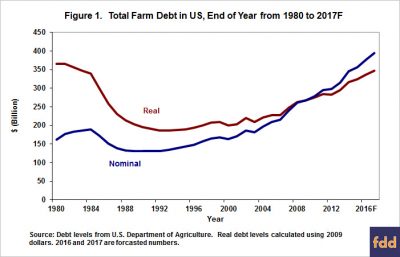The U.S. Treasury Department on Tuesday issued a proposed rule governing how biofuel makers can access a $1-per-gallon tax credit for low-carbon transportation fuels, including aviation fuel. The rule was…
Interest Deduction Tax Proposal Concerns Farmers
Richard Rubin reported yesterday at The Wall Street Journal Online that, “Republicans looking to rewrite the U.S. tax code are taking aim at one of the foundations of modern finance—the deduction that companies get for interest they pay on debt.
“That deduction affects everyone from titans of Wall Street who load up on junk bonds to pay for multibillion-dollar corporate takeovers to wheat farmers in the Midwest looking to make ends meet before harvest. Yet a House Republican proposal to eliminate the deduction has gotten relatively little sustained public attention or lobbying pressure.”

Mr. Rubin explained that, “Getting rid of the deduction for net interest expense, as House Republicans propose, would alter finance. It also would generate about $1.5 trillion in revenue for the government over a decade, according to the Tax Foundation, allowing for investment breaks and rate cuts elsewhere in the tax code.”
The Journal article pointed out that:
But for some debt-reliant businesses the interest deduction’s demise could be a significant blow. Crop growers who depend on bridge loans to work through seasonal business fluctuations could face higher tax bills for little benefit.
“Andy Hill, who farms corn and soybeans on about 600 acres in north-central Iowa, said he pays less than $10,000 a year in interest on a line of credit between $100,000 and $200,000. That loan helps him bridge gaps between his expenses and his income, between when he needs to buy seed and fertilizer and when he sells his crops.
“‘[Losing the ability to deduct interest] wouldn’t put me in the red by any stretch of the imagination, but it makes it very debilitating as far as household income,’ said Mr. Hill, who added that he has spoken to both of his senators and his House member about the issue.”
Yesterday’s article pointed out that, “Because so much is at stake for so many sectors, writing the law could get messy. [Rep. Kevin Brady (R., Texas), the author of the plan] said small businesses and utilities could get exceptions or specialized rules, as would debt-financed purchases of land, which wouldn’t be eligible for immediate investment write-offs.
“The administration, including a president who proclaimed himself the ‘king of debt,’ has been wary of repealing the interest deduction but hasn’t drawn a hard line. Treasury secretary Steven Mnuchin has said his preference is to keep it. Resistance could build among Republicans in Congress and among real-estate firms and the agriculture industry, which have formed a coalition to fight the proposal. Yet financial markets so far have registered little reaction to the prospect of the interest deduction going away. One reason: The tax change most likely would apply to new loans only.”
With respect to agricultural resistance to the tax idea, Naomi Jagoda reported earlier this month at at The Hill Online that, “More than 30 agriculture groups are expressing concerns about House Republicans’ proposal to eliminate the deduction for interest expenses as part of corporate tax reform.






